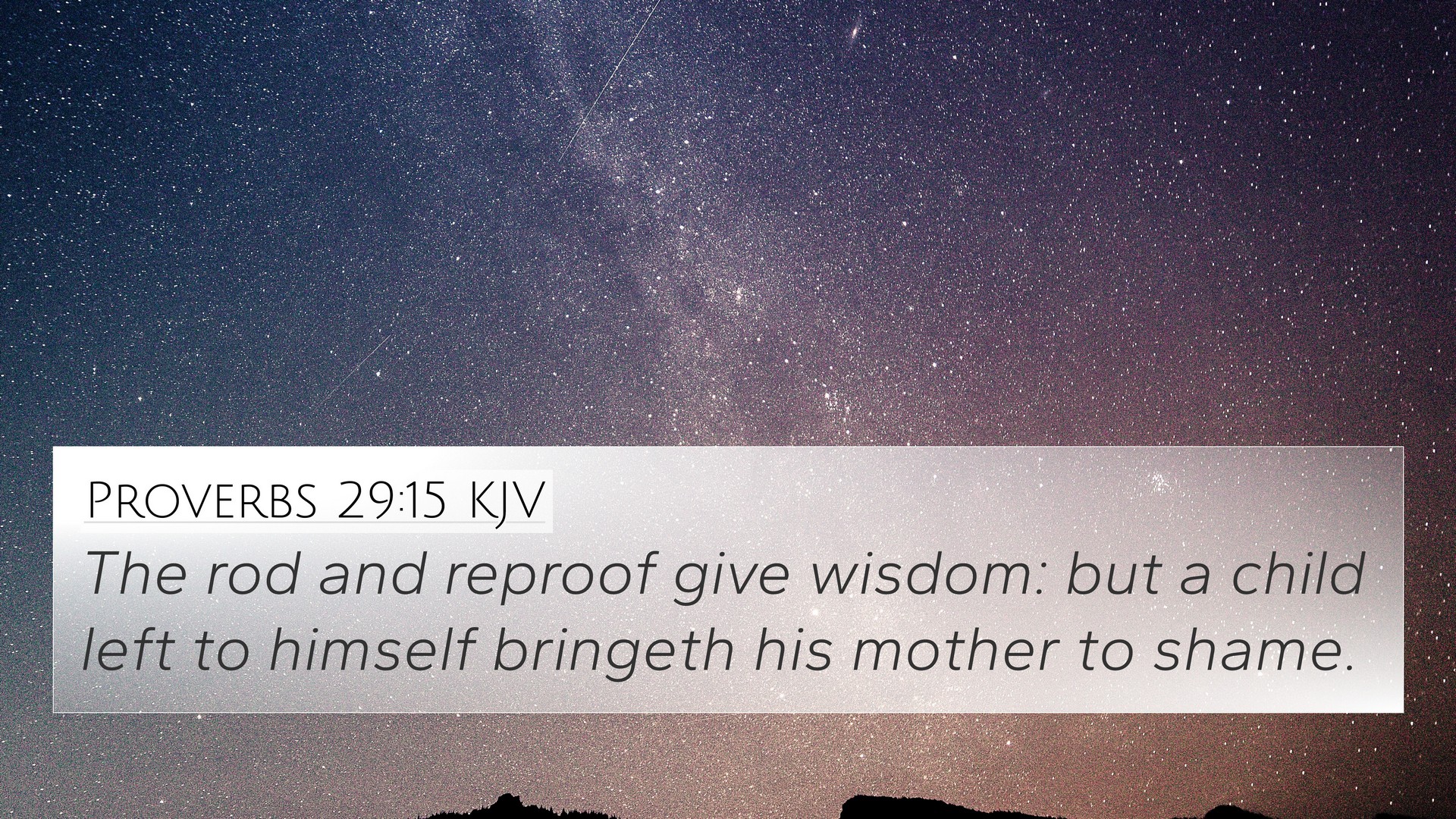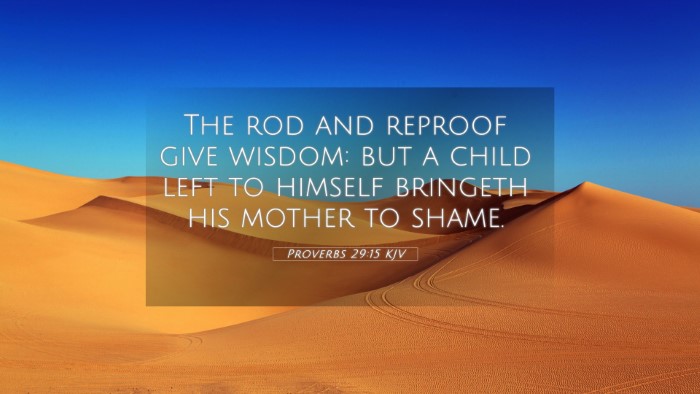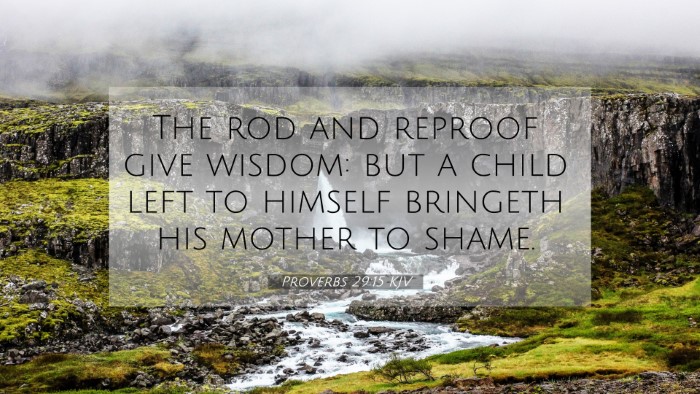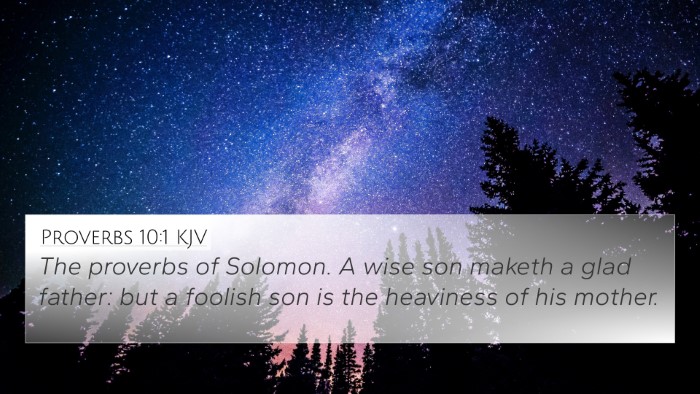Understanding Proverbs 29:15
Verse: "The rod and reproof give wisdom: but a child left to himself bringeth his mother to shame."
Proverbs 29:15 emphasizes the importance of discipline and guidance in the upbringing of a child. It highlights that correction and instruction lead to wisdom, while neglecting a child can result in shame and sorrow for the parents.
Summary of Insights
- Matthew Henry: In his commentary, Henry remarks on the necessity of discipline. He notes that wisdom is cultivated through the 'rod' (discipline) and 'reproof' (correction). He emphasizes that parents should actively engage in their children's upbringing, lest they grow unruly and shameful.
- Albert Barnes: Barnes provides a detailed explanation, stating that the 'rod' signifies correction and authority. He suggests that proper guidance leads children to develop good judgment and character, while neglect can lead them astray, causing embarrassment and distress to their families.
- Adam Clarke: Clarke emphasizes the dual aspects of love and discipline that should guide parenting. He warns against the consequences of a lack of supervision, suggesting that a child who is left to their own devices can get influenced negatively, resulting in shame not just for the child, but for the family as a whole.
Key Themes
- Discipline: The importance of discipline is a recurrent theme in Scripture. This verse indicates that proper discipline is essential for wisdom in children.
- Wisdom: Wisdom is often depicted in the Bible as a valuable asset acquired through learning and correction.
- Parental Responsibility: The role of a parent is demonstrated as crucial. Both guidance and discipline are necessary for a child's proper growth.
- Consequences of Neglect: The verse warns of the dangers of neglecting a child’s upbringing, leading to shame for the parents.
Bible Cross References
Understanding Proverbs 29:15 is enriched when cross-referenced with other pertinent scriptures. Here are some related verses:
- Proverbs 13:24: "He that spareth his rod hateth his son: but he that loveth him chasteneth him betimes." - This verse directly supports the idea that discipline is an expression of love.
- Hebrews 12:11: "Now no chastening for the present seemeth to be joyous, but grievous: nevertheless afterward it yieldeth the peaceable fruit of righteousness unto them which are exercised thereby." - It illustrates the outcomes of discipline and correction.
- Ephesians 6:4: "And, ye fathers, provoke not your children to wrath: but bring them up in the nurture and admonition of the Lord." - This underscores parental duty in nurturing children positively through guidance and discipline.
- Proverbs 22:6: "Train up a child in the way he should go: and when he is old, he will not depart from it." - It highlights the lifelong benefits of childhood instruction.
- Proverbs 19:18: "Chasten thy son while there is hope, and let not thy soul spare for his crying." - A call to parents to seize the opportunity to correct when it matters most.
- Proverbs 23:13-14: "Withhold not correction from the child: for if thou beatest him with the rod, he shall not die. Thou shalt beat him with the rod, and shalt deliver his soul from hell." - A stark reminder of the stakes in raising a child well.
- 1 Corinthians 10:11: "Now all these things happened unto them for ensamples: and they are written for our admonition, upon whom the ends of the world are come." - This illustrates that past lessons serve as warnings and guidance for our conduct today.
- Colossians 3:21: "Fathers, provoke not your children to anger, lest they be discouraged." - Complementing the wisdom in Proverbs, this verse suggests a balance in parenting.
Inter-Biblical Connections
This verse links closely with various biblical principles and teachings throughout the scriptures: it reflects themes of discipline found in both the Old and New Testaments, as well as cross-referenced wisdom literature.
Thus, God's design for parenting merges accountability, care, and wisdom acquisition, as observed through scriptural cross-referencing. Such connections provide tools for deeper study and enrich understanding of the holistic biblical narrative regarding child-rearing.
Conclusion
Proverbs 29:15 serves as a vital reminder of the critical role that discipline plays in cultivating wisdom in children. Through a comprehensive study and comparison with other related verses, one gains insight into the broader theological themes present in the Bible surrounding parenting, wisdom, and responsibility. For anyone engaging with this scripture, the importance of proactive guidance and loving correction cannot be overstated, as it leads not only to personal growth for the child but also honor for the family.














